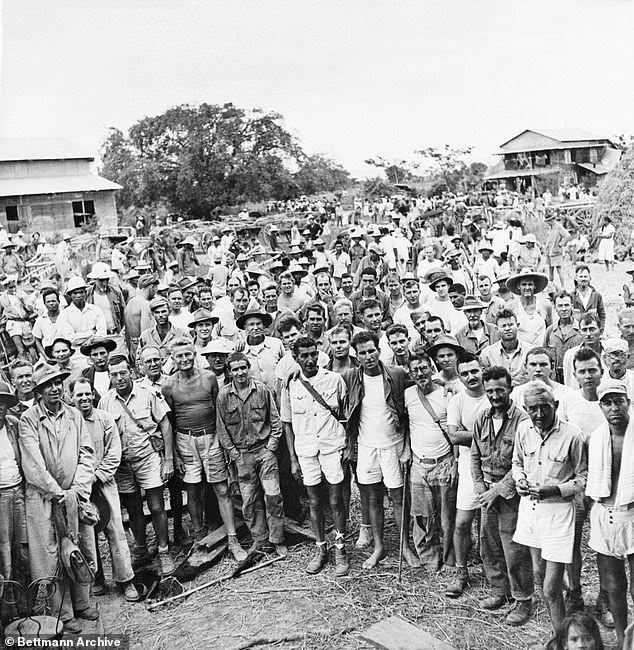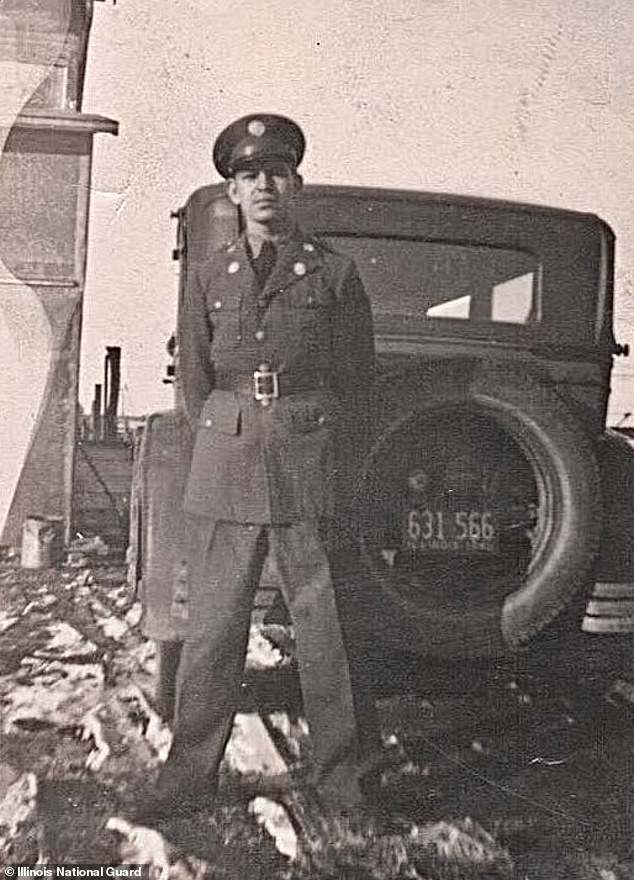The remains of a missing World War II soldier have been identified after the man died in a Japanese prisoner of war camp more than 80 years ago.
U.S. Army Private First Class Harry Jerele, Illinois, died of pneumonia at the age of 26 in the Philippines and was buried with other deceased prisoners in a mass grave.
The remains from that grave were exhumed in 2020 and analyzed by forensic scientists who used anthropological analysis, circumstantial evidence and DNA analysis to determine that the remains were Jerele.
After 81 years, the fallen soldier will be buried in his homeland this October.
U.S. Army Private First Class Harry Jerele, Illinois, died of pneumonia at the age of 26 in the Philippines and was buried with other deceased prisoners in a mass grave.

His niece, Rosemary Dillion, is his only surviving relative. “It’s a great feeling to finally get this identification,” Dillon said. ‘I wish my mother and grandmother were here to witness his return home’
“This is a miracle,” said Rosemary Dillon, Jerele’s niece, of the Defense POW/MIA Accounting Agency’s (DPAA) accounting of Jerele’s remains.
‘We have been trying for about 10 years to positively identify his remains. A lot of time has passed. What a joyous occasion it will be when he is finally laid to rest in his native country!
Dillon of Chicago said she was a little girl when Jerele left for military service, but she remembers him as a quiet man who liked to sing and play the guitar. She said it is “a miracle” that his remains have finally been identified.
“It’s a great feeling to finally get this identification,” Dillon said. “I wish my mother and grandmother were here to witness his return home.”
Jerele is from the small town of Berkeley, where about 5,300 people currently live, and was one of seven children born to Leopold Jerle and Mary Flori-Jerele on February 1, 1916.

Jerele is from the small town of Berkeley, where about 5,300 people currently live, and was one of seven children born to Leopold Jerle and Mary Flori-Jerele on February 1, 1916.
He joined the Army in September 1940 and served with Company B, 192nd Tank Battalion in the Philippines during the war, but was captured following the American surrender of the Bataan Peninsula on April 9, 1942.
That day, American General Edward P. King surrendered to Japanese General Masahrau Homma, who took about 75,000 prisoners (12,000 Americans and 63,000 Filipinos) on the 65-mile Death March to the Cabanatuan prison camp.
Details about the circumstances under which the American prisoners held at Cabanatuan lived and died were complicated, as were attempts to unearth and identify their remains after the end of the war.
More than 2,500 prisoners of war (POWs) died in the camp during the war.
After the war, American Graves Registration Service (AGRS) personnel exhumed those buried at Cabanatuan Cemetery and moved the remains to a temporary United States military mausoleum near Manila.
In 1947, the AGRS examined the remains for identification.
Two sets of remains from Mass Grave 804 were identified, but the remaining two were declared unidentifiable, including those from Jerele.
The unidentified remains were buried at the Manila American Cemetery and Memorial (MACM) as Unknown.
It wasn’t until 2020 that forensic scientists became involved to help identify the remains and return them to the men’s families.
And he announced on April 18 that a group belonged to Jerele.
Jerele and his fellow soldiers of the 192nd Tank Battalion were the longest serving American prisoners of war in World War II.
Company B, 192nd Tank Battalion, included 104 Illinois soldiers.
The unit suffered 43 casualties during World War II, including 28 who died from illness, disease and wounds. Seven people died when they sank aboard several Japanese prisoner-of-war ships, called “hell ships” by American troops. Eight died in combat and five were declared missing in action.

Details about the circumstances under which the American prisoners held at Cabanatuan (pictured) lived and died were complicated, as were attempts to unearth and identify their remains after the end of the war.

After 81 years, fallen soldier will be buried in his homeland in October
Headquarters Company, 192nd Tank Battalion, included 31 Illinois Army National Guard soldiers, of whom 19 died due to illness, disease, and wounds, one died aboard a Japanese ship, and one died in action.
“The men of Company B, 192nd Tank Battalion, many of them from Maywood, were mostly boys from the same high school,” the Illinois National Guard said in a statement.
“In 1940, a federal draft law was passed and they knew it was only a matter of time before they would be drafted into the military.”
‘Upon learning that the federal government was going to federalize National Guard units for a one-year period of military service, these men decided to join the National Guard to fulfill their military obligation.’
Illinois Governor JB Pritzker said: ‘On behalf of the state of Illinois, I want to thank everyone involved in bringing Harry Jerele home to his family in Illinois.
“The epic story of Maywood’s Company B, 192nd Tank Battalion lives on thanks to many who have never forgotten what these Illinois soldiers sacrificed for their nation.”

